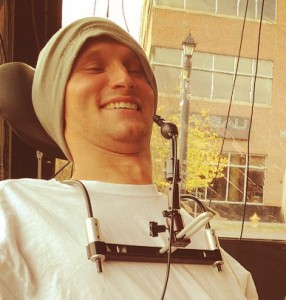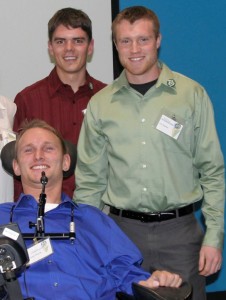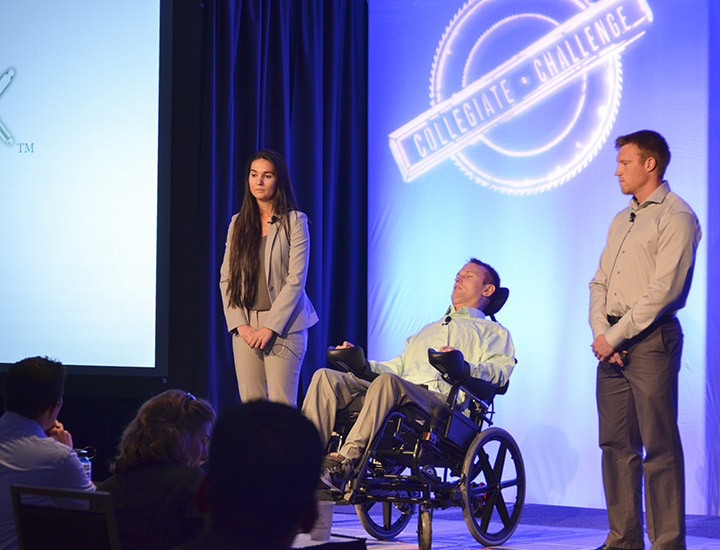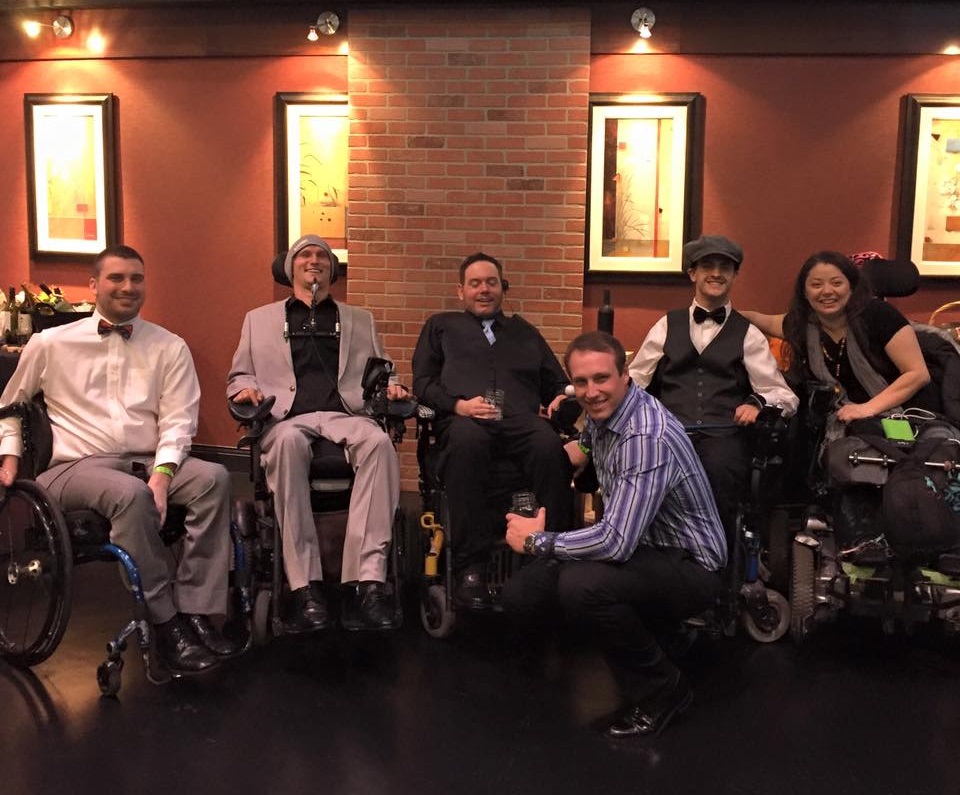As appearing in SOURCE

John Morris is a 28-year-old economics alumnus from Fort Collins who has invented a new suspension system for wheelchairs — because he uses one.
Morris was paralyzed from the neck down as an 18-year-old high school senior. He and his friends built a snow ramp for snowboarding and he landed on his head, fracturing his neck at C4 and C6 and bursting the C5 disc. Flight for life took him to the hospital where he spent four and a half months before being discharged.
Two years later he decided to pursue his college career studying economics at CSU, starting in the spring of 2009.
“I figured out I really love macroeconomic policy and macroeconomics,” Morris said. “The whole economics department was amazing. They were really fun to be around and I loved all the professors, they made it really interesting.”
During his time at CSU, Morris took nine credits per semester. Through Medicaid’s Consumer Directed Attendant Support Services, Morris was able to hire 11 people to help him day to day, with three to four of his helpers assisting each day. They helped him get ready in the morning and eat, then went to school with him, taking notes and managing his emails. They also helped him with homework and his business work in the evenings.
“It’s a really cool program because obviously if you’re in a position to have to be around somebody for the entirety of the day every day, all the time, you might as well at least like the person that you’re with,” said Rachelle, one of his assistants. “John and I have become quite good friends, so we always have fun.”
‘On my own’
At first, Morris was not familiar with most services available to him at CSU.
“My first year I had to do everything on my own,” he said. “I didn’t know about the Assistive Technology Resource Center (ATRC), or the Occupational Therapy department that’s here on campus, or Resources for Disabled Students (RDS). I had to do a lot of things with my mouth stick, I had to peck at the keyboard to write my papers until the ATRC helped me with a head tracker, voice capabilities, and my computer. At RDS, all those guys are awesome.”
In an interview shortly before he graduated, Morris talked about the process he would have to go through to take tests. He would schedule his exams in advance with Resources for Disabled Students, then go with an assistant to their testing rooms, read the questions, and have his assistant transcribe his answers.
“College is no joke. It’s tough, even if you’re able-bodied. College is tough. It’s something you really have to work on. It is a job,” said Morris. “You have to put in the time and effort to get what you want out of that class, to really understand, to be compassionate and passionate about what you do. That’s probably the hardest thing that I had to find here at CSU, but my senior year has been awesome. One of my favorite aspects is to now graduate after all the hard work.”
Morris has nearly no complaints about the accommodations CSU offered him as a disabled student.
“Every professor was so accommodating and awesome, never once a problem,” said Morris. “The only thing I would say is that the handicapped desk area in most classrooms sucks. If we could get some more room for people in chairs that would be great. I’m in a powered chair, I’m a big guy, I’m 6’5’’, so I would love a little more space around the desks.”
A revelation
Morris used a manual wheelchair, pushed by an attendant, for five years before he switched to a powered chair. And that is when his idea for his business took off.
“While I was attending CSU I realized ‘Oh man, why do I have somebody pushing me around? I would rather jump into one of these powered chairs so I can do everything on my own,’” said Morris. “And that’s when I made the realization of ‘Hey, why does my powered chair have suspension and not my manual chair?’ The quality of ride is so much nicer when a chair has suspension.”
That’s when he came up with his idea. He took a class for his business minor last spring called Introduction to Entrepreneurship, and he brought up his idea to his professor and explained that he wanted to take it further. At the end of the class, professor Burton Deines showed him the Venture Accelerator Program through the Institute of Entrepreneurship, which is in the College of Business. That’s where he found his colors.

Last fall, Morris created and became the CEO of a company called QuadshoX, seeking to provide rear-wheel suspension for manual wheelchairs. He partnered with two engineering students who he met through the Venture Accelerator Program. Josh Gladfelter and Garret Ehrick have been responsible for the engineering and design aspects of the product.
One of the subjects is a 23-year-old from Fort Collins who has cerebral palsy and is non-verbal.
“That just touched my heart right there, just what you would have to go through and not be able to tell people about it,” Morris said. “It’s just one other reason why I’m doing what I’m doing. I know what it’s like and I would like to make people’s quality of life a lot better than what it is. So anything I can do to help is great.”
Venture Accelerator winner
QuadshoX participated in the Venture Accelerator Program, which is open to majors across campus. Morris’ invention won the largest prize in the 2014 Venture Accelerator Showcase, including $2,500 in legal fees, which bought the company a provisional patent, as well as $2,000 to use towards his business. He also received $3,000 from the Business Advancement Fund to help cover the costs of the company’s first round of prototypes, the trademark, a website, and a video for a Kickstarter campaign launched at the end of May.
Instead of hiring a mainstream company to put the QuadshoX kits together, Morris decided to have his products assembled through Pueblo Diversified Industries, a nonprofit organization that employs individuals with intellectual and developmental disabilities.
“They put my kits together, put them in a box with the instructions, and they get everything ready for shipment, and they ship it off to my distributors,” said Morris. “I also have a manufacturer in Mexico, and I deal with a shock company in Taiwan.”

QuadshoX competed in the CSU Collegiate Blue Ocean Enterprises Challenge in May. While they did not win the competition, the experience lead to a significant amount of attention and press for the startup company.
Since graduation, Morris has stayed in Fort Collins to fully dedicate himself to his new company, which moved into an office space in the Rocky Mountain Innosphere this past summer. QuadshoX will be available for sale and delivery in January 2016, and can be preordered now.
In October, Morris received the Dorothy Lasley Memorial Award from the City of Fort Collins at the Mayor’s Awards Ceremony. The award recognizes Morris’ work to improve the quality of life for individuals with disabilities through his company, QuadshoX. In his acceptance speech John stated, “We may have mobility issues, but we do not have ability issues.”
More information on QuadshoX is available on its website and Facebook page.

Rachael Johnson contributed to this story.
